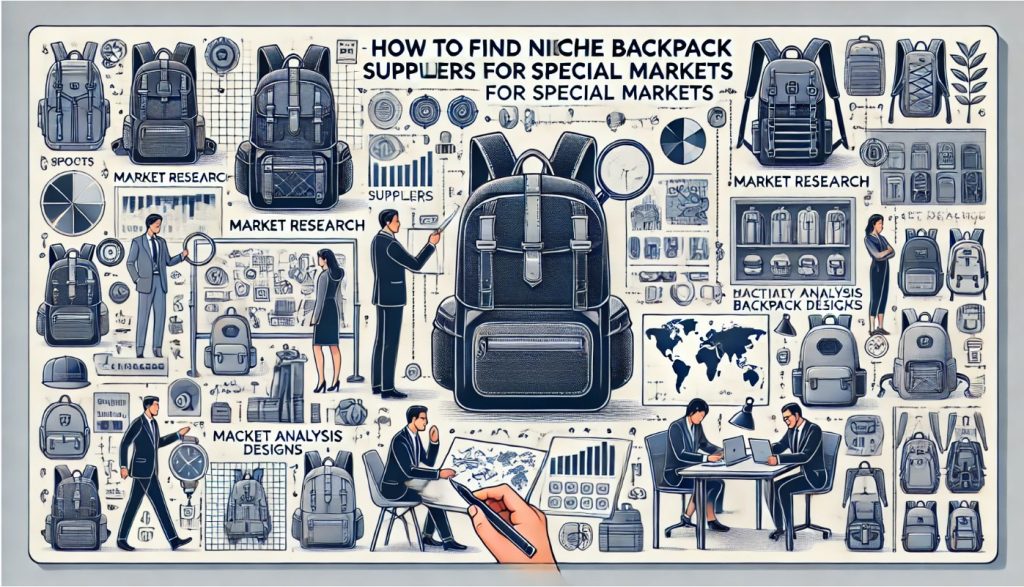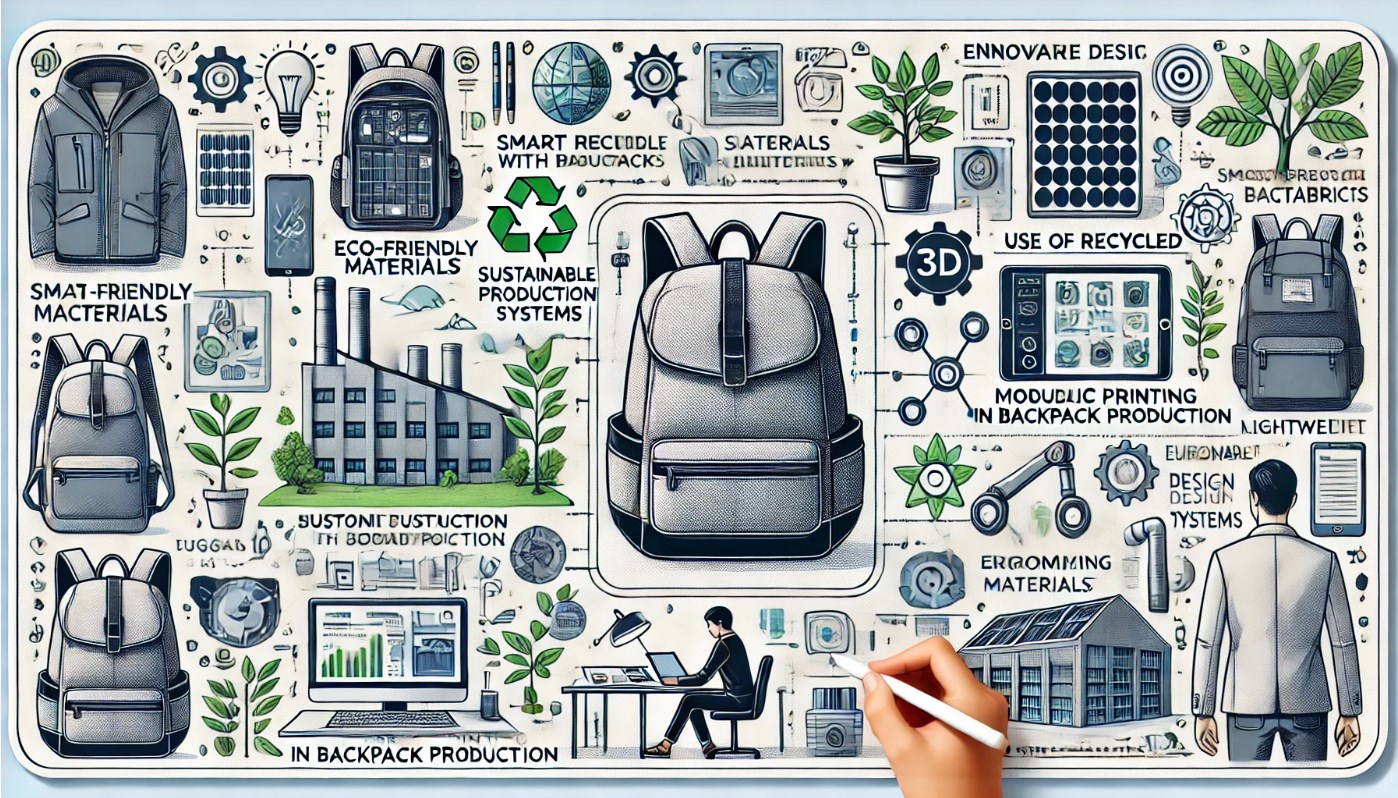The global backpack market has seen remarkable growth due to its diversity, with different industries requiring specialized bags designed for specific functions. Whether it’s a backpack tailored for hiking, school use, or tech protection, the need for niche backpacks has increased as consumers demand more specialized, high-quality products. Identifying the right suppliers for these specialized backpacks is key to meeting the demands of these diverse markets.
Need for Niche Backpacks
The Growing Demand for Specialized Backpacks
The global backpack market is constantly evolving, driven by changing consumer preferences and new technological innovations. Backpacks are no longer just a convenient way to carry items; they have become a statement of lifestyle, function, and purpose. As consumers demand backpacks that cater to specific needs, such as hiking, school, or technology storage, the industry has responded by creating a broad array of niche products.
A specialized backpack is designed with the target market’s needs in mind. For example, a hiking backpack must be lightweight, durable, and capable of carrying essential outdoor gear, while a school backpack may need to have compartments for books, laptops, and pens, with a focus on comfort and organization. Tech backpacks, on the other hand, prioritize protection for electronic devices like laptops, tablets, and accessories, with additional padding and organizational features.
These niche markets often require specialized materials, design elements, and functionality, making it essential to work with suppliers who understand the specific needs of each market.
Key Factors Driving Niche Backpack Markets
Several factors contribute to the growth of niche backpack markets:
- Increasing Outdoor Activities: As more people take up hiking, camping, and other outdoor activities, there is a growing need for backpacks designed to handle specific outdoor conditions, such as weather-resistant fabrics, water storage systems, and ergonomic designs.
- Technology Integration: The rise of tech devices, such as laptops, tablets, and smartphones, has created a demand for backpacks that provide extra protection, padding, and organization for these devices.
- School and Student Demands: School backpacks are evolving to meet the needs of students who require space for not only books and stationary but also laptops, chargers, and other electronic devices.
- Urban Commuting: Backpacks designed for commuting in urban areas often focus on functionality, convenience, and style, with features like anti-theft zippers, laptop compartments, and ergonomic straps for comfort during long commutes.
As the demand for these niche backpacks grows, it is essential for businesses to identify and source the right suppliers to meet the unique needs of each market.
Identifying Niche Backpack Suppliers
Researching and Finding Specialized Manufacturers
Finding the right niche backpack supplier begins with thorough research into manufacturers who specialize in the target market. Depending on the type of niche, suppliers may vary greatly in their expertise and capabilities. Here are several methods to identify the right suppliers:
- Industry Events and Trade Shows: Trade shows and industry events are excellent places to meet specialized manufacturers and suppliers. Events focused on outdoor gear, school products, or technology accessories can help you find suppliers who focus on producing high-quality backpacks for these specific markets.
- Online Supplier Platforms: Platforms like Alibaba, Global Sources, and ThomasNet are useful tools for discovering suppliers worldwide. These platforms provide detailed profiles of manufacturers, including their specialties, certifications, and customer reviews.
- Industry Associations and Networks: Joining industry-specific networks or associations related to hiking gear, school supplies, or tech accessories can provide you with access to trusted suppliers who have a proven track record in these sectors.
- Referrals from Peers or Industry Experts: Word of mouth and recommendations from other businesses in the same market can be invaluable when seeking a reliable supplier. Businesses that specialize in hiking gear, for instance, can often point you toward reputable backpack manufacturers who understand the specific needs of the hiking community.
Once you have identified a list of potential suppliers, it is important to evaluate their experience and capabilities in manufacturing the specific type of backpack you are seeking.
Assessing Supplier Experience and Capabilities
When evaluating potential suppliers, consider the following factors:
- Product Specialization: Some suppliers may specialize in specific types of backpacks, such as outdoor gear, school bags, or tech backpacks. Choosing a supplier with expertise in your target niche ensures that they understand the unique requirements of your market.
- Manufacturing Capacity and Scalability: Ensure the supplier can meet your production needs in terms of volume, timelines, and scalability. A supplier that can produce a small order for a specific niche but also scale up for larger orders may be beneficial.
- Custom Design Capabilities: Niche markets often require custom designs, whether it’s for specific compartments, fabric choices, or branding. Make sure the supplier is willing and able to work with you on bespoke designs.
- Quality Control: Quality control processes are critical to ensuring that the backpacks meet the required standards. Ask potential suppliers about their quality assurance methods, certifications, and inspection procedures.
Selecting the Right Supplier for Hiking Backpacks
Characteristics of Hiking Backpacks
Hiking backpacks are designed for outdoor enthusiasts who need durable, functional, and comfortable backpacks to carry their gear on long treks. To identify the right supplier for hiking backpacks, it’s important to understand the key characteristics that make a hiking backpack suitable for this market:
- Durability: Hiking backpacks are often exposed to harsh conditions, including rain, dirt, and rough terrain. The materials used in the backpack should be durable and weather-resistant, such as ripstop nylon or high-denier polyester.
- Comfort: Long hikes require backpacks that are comfortable to carry for extended periods. Look for backpacks with padded straps, breathable mesh back panels, and adjustable hip belts to help distribute weight evenly.
- Storage and Organization: Hiking backpacks should have multiple compartments to store essentials like water bottles, snacks, and maps. Some may also have hydration systems or attachment points for gear like trekking poles and sleeping bags.
- Water Resistance: Hiking backpacks often need to withstand exposure to rain and wet conditions. Look for manufacturers that offer water-resistant or waterproof options, such as backpacks with sealed zippers or rain covers.
Finding Hiking Backpack Suppliers
To find suppliers that specialize in hiking backpacks, consider the following strategies:
- Outdoor Gear Manufacturers: Look for manufacturers who produce outdoor gear or specialize in hiking equipment. These suppliers are more likely to understand the specific needs of hikers and the durability required for outdoor conditions.
- Collaborations with Outdoor Brands: Some backpack manufacturers collaborate with well-known outdoor brands or designers. These collaborations can result in high-quality, branded hiking backpacks that meet the needs of the hiking community.
- Supplier Certifications: Look for suppliers who hold certifications related to outdoor gear manufacturing, such as ISO 9001 or ISO 14001, which demonstrate their commitment to quality and environmental responsibility.
Customization and Design for Hiking Backpacks
Customization is a key consideration when sourcing hiking backpacks. Whether it’s adding logos, creating unique color schemes, or adjusting the design for specific storage needs, it’s important to work with a supplier that can provide tailored solutions. Be sure to communicate your design specifications clearly and discuss the customization options with the supplier.
Selecting the Right Supplier for School Backpacks
Characteristics of School Backpacks
School backpacks need to be functional, durable, and comfortable, while also being stylish and appealing to students. Some of the key characteristics of school backpacks include:
- Durability and Strength: School backpacks often carry heavy books, laptops, and other educational tools. They need to be able to handle the weight and daily wear and tear.
- Organization: School backpacks should offer multiple compartments for books, notebooks, stationery, and tech devices. Padded laptop compartments and extra pockets for pens, pencils, and phones are common features.
- Comfort: School bags should be designed to be comfortable for children and teenagers to carry, with padded shoulder straps and adjustable waist belts to distribute weight evenly.
- Design and Appeal: School backpacks should be visually appealing, with designs that attract children and teenagers. Many students prefer backpacks with fun prints, characters, or custom designs that reflect their personality.
Finding School Backpack Suppliers
When sourcing suppliers for school backpacks, consider the following:
- Experience in Educational Products: Manufacturers who specialize in school bags or children’s products will be familiar with the durability, safety, and design needs of school backpacks.
- Customization Capabilities: School backpacks often need to be customized for different schools, grades, or themes. Look for suppliers who offer a wide range of design options and can accommodate customization requests.
- Compliance with Safety Regulations: School backpacks must meet specific safety standards, such as CPSIA compliance in the U.S. or EN71 certification in Europe. Verify that the supplier adheres to relevant safety regulations.
Design Innovation for School Backpacks
To stand out in the competitive school backpack market, suppliers should offer design innovation. Features like ergonomic back panels, reflective strips for safety, and RFID-blocking compartments for tech devices are becoming increasingly popular in school backpacks.
Selecting the Right Supplier for Tech Backpacks
Characteristics of Tech Backpacks
Tech backpacks are designed to store and protect electronic devices such as laptops, tablets, and smartphones. Key characteristics of tech backpacks include:
- Device Protection: Tech backpacks should have padded compartments or specialized sleeves to protect fragile electronics from damage.
- Organization: Tech backpacks often feature compartments specifically designed for cables, chargers, and other accessories. Multiple pockets for organization are essential.
- Material Quality: The materials used should be strong, lightweight, and water-resistant to protect electronic devices from the elements.
- Ergonomics: Since tech backpacks often carry heavy electronics, comfort is important. Look for backpacks with adjustable straps, padded back panels, and ergonomic designs for long-term wear.
Finding Tech Backpack Suppliers
When sourcing suppliers for tech backpacks, look for:
- Experience with Electronic Accessories: Suppliers with experience in manufacturing tech products will have the necessary knowledge and expertise to create backpacks that meet the specific needs of tech enthusiasts.
- Innovative Features: Many consumers expect tech backpacks to include features like USB charging ports, anti-theft zippers, or RFID protection. Suppliers who offer such innovations will be well-suited to meet the needs of this market.
- High-Quality Materials: Ensure that the supplier uses high-quality, durable materials such as ballistic nylon, water-resistant zippers, and soft-touch linings to protect sensitive tech devices.
Customization for Tech Backpacks
Tech backpacks often require a high degree of customization, such as adding extra compartments or designing specific internal layouts for electronics. A good supplier should be able to accommodate custom features, while still maintaining the required level of protection for devices.
Building Strong Relationships with Niche Backpack Suppliers
Communication and Transparency
Clear communication is essential when working with suppliers for niche products. Be transparent about your design, quality, and shipping requirements, and establish a process for regular updates throughout the production process.
Supplier Audits and Visits
To ensure quality and trustworthiness, consider conducting factory audits or visits. Seeing the supplier’s production process firsthand helps you assess their capabilities and quality control measures.
Long-Term Partnerships
Building long-term relationships with your suppliers can lead to better pricing, consistent quality, and smoother operations. Niche backpack suppliers often prefer to work with reliable, repeat customers, which can lead to mutual growth and success in the specialized markets.







